What are Warts?

Verrucas or Plantar Warts
Warts are one of several soft tissue conditions of the foot that can be quite painful. They are caused by a virus and can appear anywhere on the skin. Those that appear on the sole of the foot are called plantar warts, or verruca plantaris. Children, especially teenagers, tend to be more susceptible to warts than adults. Some people seem to be immune to warts.
The right doctor for treating plantar warts is a podiatrist, who unlike medical doctors, specializes specifically in ALL conditions related to foot and ankle. Dr. Isaac Tabari is an acclaimed expert in dermatological conditions of the foot & ankle, such as plantar warts. Patients travel to him from across the world to diagnose and treat their stubborn conditions. Dr. Tabari’s unique approach to attacking foot warts helps him lead the way in treating this condition. Come see us at NYC Podiatry Center if you are suffering from this condition.
Foot Warts Causes:
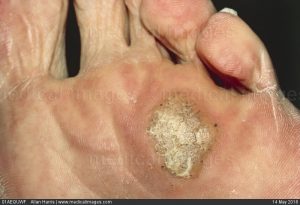 The virus that causes warts generally invades the skin through small or invisible cuts and abrasions. The plantar wart is often contracted by walking barefoot on dirty surfaces or littered ground where the virus is lurking. The causative virus thrives in warm, moist environments, making infection a common occurrence in communal bathing facilities.
The virus that causes warts generally invades the skin through small or invisible cuts and abrasions. The plantar wart is often contracted by walking barefoot on dirty surfaces or littered ground where the virus is lurking. The causative virus thrives in warm, moist environments, making infection a common occurrence in communal bathing facilities.
If left untreated, warts can grow to an inch or more in circumference and can spread into clusters of several warts; these are often called mosaic warts. Like any other infectious lesion, plantar warts are spread by touching, scratching, or even by contact with skin shed from another wart. The wart may also bleed, creating another route for spreading. Occasionally, warts can spontaneously disappear after a short time, and, just as frequently, they can recur in the same location.
Symptoms/Identification
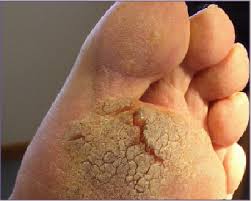 Most warts are harmless, even though they may be painful. They are often mistaken for corns or calluses, which are layers of dead skin that build up to protect an area which is being continuously irritated. The wart, however, is a viral infection.
Most warts are harmless, even though they may be painful. They are often mistaken for corns or calluses, which are layers of dead skin that build up to protect an area which is being continuously irritated. The wart, however, is a viral infection.
Plantar warts tend to be hard and flat, with a rough surface and well-defined boundaries; warts are generally raised and fleshier when they appear on the top of the foot or on the toes. Plantar warts are often gray or brown (but the color may vary), with a center that appears as one or more pinpoints of black. It is important to note that warts can be very resistant to treatment and have a tendency to reoccur.
When plantar warts develop on the weight-bearing areas of the foot (the ball of the foot, or the heel, for example), they can be the source of sharp, burning pain. Pain occurs when weight is brought to bear directly on the wart, although pressure on the side of a wart can create equally intense pain.
Home Care
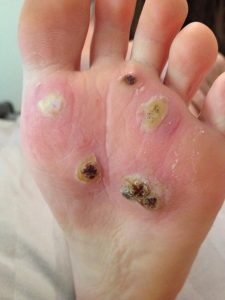 Self-treatment is generally not advisable. Over-the-counter preparations contain acids or chemicals that destroy skin cells, and it takes an expert to destroy abnormal skin cells (warts) without also destroying surrounding healthy tissue. Self-treatment with such medications especially should be avoided by people with diabetes and those with cardiovascular or circulatory disorders. Never use these medications in the presence of an active infection.
Self-treatment is generally not advisable. Over-the-counter preparations contain acids or chemicals that destroy skin cells, and it takes an expert to destroy abnormal skin cells (warts) without also destroying surrounding healthy tissue. Self-treatment with such medications especially should be avoided by people with diabetes and those with cardiovascular or circulatory disorders. Never use these medications in the presence of an active infection.
When to Visit a Podiatrist
It is wise to consult a podiatrist when any suspicious growth or eruption is detected on the skin of the foot in order to ensure a correct diagnosis. It is possible for a variety of more serious lesions to appear on the foot, including malignant lesions such as carcinomas and melanomas. Although rare, these conditions can sometimes be misidentified as a wart.
Diagnosis and Treatment
It is possible that your podiatric physician will prescribe and supervise your use of a wart-removal preparation. More likely, however, removal of warts by a simple surgical procedure, performed under local anesthetic, may be indicated.
Lasers have become a common and effective treatment. A procedure known as CO2 laser cautery is performed under local anesthesia in either your podiatrist’s office surgical setting or an outpatient surgery facility. The laser reduces post-treatment scarring and is a safe form for eliminating wart lesions.
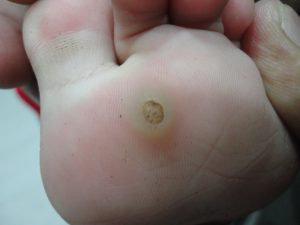
Prevention
According to the American Podiatric Medical Association, the following may prevent plantar warts
- Avoid walking barefoot
- Change shoes and socks daily
- Keep feet clean and dry
- Check children’s feet periodically
- Avoid direct contact with warts from other persons or from other parts of the body
- Do not ignore growths on, or changes in, your skin
- Visit your podiatric physician as part of your annual health checkup
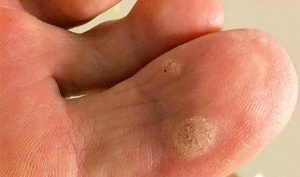 Plantar Warts on Foot Questions & Answers
Plantar Warts on Foot Questions & Answers
- Question: How can you tell the difference between a corn and a wart?
Answer: Corns and warts are two common foot conditions. Without examining your foot, we cannot tell you whether the bump on your foot or toe is a wart or corn. We recommend that you make an appointment to have it checked out. If it is a wart it will need immediate treatment. However, we can tell you how the two are different. The difference between these two conditions is that corns are concentrated only on the feet while warts can appear all over the body. Corns occur when there is localized high friction pressure on the bony prominences of the foot. The foot then responds to the added pressure by thickening the skin in that area to protect itself. Such skin pressure causes an inadequate blood circulation in the skin to cause corns. A corn doesn’t itch or bleed. You feel no pain if you pinch it. The only pain you may feel from a corn is direct pressure when you stand up or walk. On the other hand, a wart is not related to friction. It is a skin condition caused by the human papillomavirus through direct contact. Corns are not infectious while warts are contagious and hence should be treated as quickly as possible. Again, please visit a podiatrist to get diagnosed and treated. - Question: Are plantar warts contagious?
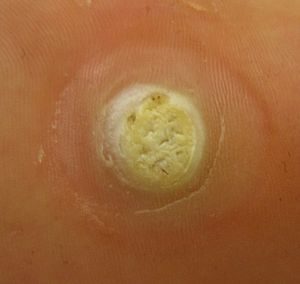 Answer: As stated previously, warts are caused by a viral infection (HPV), which thrives in hot, moist areas. The HPV virus enters the system through a cut or damaged area of the skin and then manifests itself as a bump or bumps that can appear anywhere on the body. Children and teens are often afflicted with warts. So, yes, warts are infectious and should be treated immediately. While usually, warts do not grow much bigger than a pencil eraser, unfortunately, some grow and multiply. When they multiply, they are called “mosaic” warts. Upon close examination, some of these growths seem to have seeds, which are actually tiny blood vessels that grow into the wart.
Answer: As stated previously, warts are caused by a viral infection (HPV), which thrives in hot, moist areas. The HPV virus enters the system through a cut or damaged area of the skin and then manifests itself as a bump or bumps that can appear anywhere on the body. Children and teens are often afflicted with warts. So, yes, warts are infectious and should be treated immediately. While usually, warts do not grow much bigger than a pencil eraser, unfortunately, some grow and multiply. When they multiply, they are called “mosaic” warts. Upon close examination, some of these growths seem to have seeds, which are actually tiny blood vessels that grow into the wart. - Question: Should I self-treat or see a podiatrist?
Answer: We strongly recommend that you seek a professional diagnosis when it comes to plantar’s warts which can be mistaken for corns or callouses. Misdiagnosis can cause problems.
It is especially important to see a foot doctor if your warts are painful or if they’ve grown or multiplied. Self-treatment of warts, which generally includes products containing acids, is tricky. Care must be taken with over-the-counter products because they can burn or damage the healthy tissue surrounding the wart and not affect the wart at all.
In addition, in no case should you self-treat warts if you are diabetic or have circulatory, immunological, or neurological problems. Warts can spread. Treatment at NYC Podiatry Center of Excellence will jump-start the healing process and protect your family and others from an outbreak of warts. - Question: How can I prevent foot warts?
Answer: There are some precautions you can take to avoid coming into contact with the HPV, wart, virus:
– Don’t walk barefoot in locker rooms, pools, gyms, and most other public areas. Remember—the virus likes “warm” and “moist.”
– Avoid direct contact with warts. They are contagious.
– Check your and your children’s feet regularly.
– Keep your feet clean and dry.
– Change your socks and shoes daily.
– Do not ignore changes in your skin
To read further about plantar warts (foot warts) and treatments provided by NYC Podiatry Center of Excellence, visit our detailed Plantar Warts Guide.
Call NYC Podiatry Center located in Midtown, NY and make an appointment for a skin check or treatment for warts: or click to call 212.288.3137.
- Podiatrist that does Telemedicine / Video Calls - March 28, 2020
- Podiatrists Accept EmblemHealth and GHI Insurance Plans - October 11, 2018
- NYC’s Celebrity Podiatrist for film, entertainment, athletic and modeling industries - September 20, 2018





